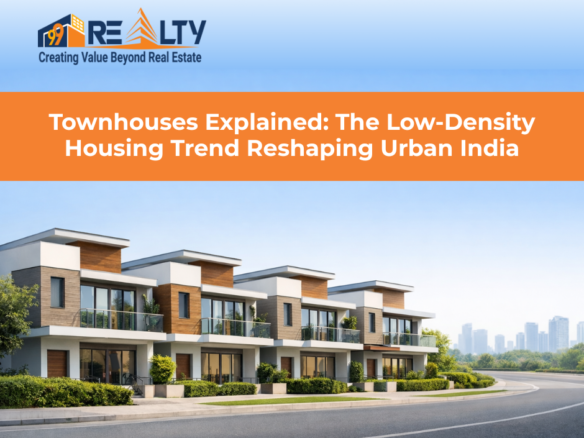In India, buying property is rarely just about numbers. It’s about dreams, aspirations, and sometimes even the need to fulfill family expectations. For most Indians, property symbolizes not only financial security but also social status and cultural pride. The decision of whether to buy in a village, block, town, or city often feels like standing at a crossroads—with each path leading to a very different lifestyle and future.
But how do you know which option is right for you? Should you go for the affordable charm of a village, the growing potential of a block, the balanced lifestyle of a town, or the fast-paced opportunities of a city? Let’s break it down, step by step.
Understanding Property Location Choices
Every property location carries its own personality—almost like people. Villages are calm and deeply connected to roots, blocks are young and ambitious, towns are mature yet balanced, and cities are bold and fast-paced. To make the right decision, you need to understand what each of these choices truly means in the Indian context.
Property Law Alert : SC Redefines Ownership Rules
Village Properties
Villages represent the heart of India. They’re where traditions are preserved, where festivals light up entire communities, and where life is still simple. Property here is mostly agricultural land or residential plots—often priced at a fraction of what you’d pay in urban spaces.
Block-Level Properties
Blocks act as the bridge between rural and urban. They are administrative hubs, slightly more developed than villages, often hosting schools, small markets, and government offices. Properties here come with growth potential but also with uncertainty.
Town Properties
Towns are growing urban centers with a blend of tradition and progress. They offer a lifestyle that’s neither too slow nor overwhelmingly fast, making them attractive for families seeking balance.
City Properties
Cities, especially metros, are India’s engines of growth. These are where industries thrive, careers flourish, and property values soar. Buying here is expensive, but it offers unmatched opportunities.
Advantages of Buying Property in Villages
Vasanthi Veluri and Anurag Chatrath (Uttarakhand): This couple left their high-profile careers in design and banking to live in a remote Himalayan village near Almora. They now practice sustainable living by growing their own food. Vasanthi runs a craft studio, Peoli, where she works with local artisans, while Anurag continues to consult remotely.
Low-Cost Living and Affordable Land
One of the biggest draws of villages is affordability. With the same budget that might get you a small flat in a city suburb, you could buy vast plots of land in a village. This makes it especially appealing for those who dream of spacious living, open courtyards, and maybe even owning farmland. For many families, this is a way to hold on to generational wealth, since land is seen as something that never loses its cultural value—even if the monetary appreciation is slow.
Closer to Nature and Community Living
There’s something priceless about waking up to the sound of birds instead of honking cars. Villages provide that connection with nature that cities can never replicate. Add to this the warmth of community living—where neighbors know each other like family, festivals are celebrated together, and no one feels alone. For retirees or people looking to slow down, this kind of life feels deeply fulfilling.
Agricultural and Farming Opportunities
For those with an interest in agriculture, village properties open doors to farming, dairy, and allied businesses. With organic food gaining popularity, a small patch of land in a village can even become a sustainable income source. Many urbanites are now exploring “weekend farming,” which reflects a return to roots in a modern way.
Disadvantages of Buying Property in Villages
Lack of Infrastructure and Modern Amenities
The charm of nature often comes at the cost of convenience. Villages, in most cases, lack reliable healthcare, advanced schools, or entertainment hubs. Internet and transportation can be patchy, making it tough for younger generations or professionals to adjust.
Limited Employment Opportunities
Unless you’re into farming, running a local business, or working remotely, job opportunities are scarce. Most educated youth migrate to towns and cities, which sometimes leaves villages populated mostly by the elderly.
Low Resale Value and Demand
Real estate thrives on demand, and villages rarely attract outside buyers. This means that while you may get land cheaply, selling it later at a profit could be difficult. For investors looking for quick returns, this is a major drawback.
Advantages of Buying Property in Block Areas
Semi-Urban Growth Potential
Blocks are like teenagers—full of potential but not yet fully developed. They often serve as administrative centers for villages around them. When a government project like a highway, industrial park, or new school comes in, blocks can suddenly grow in value.
Better Connectivity Than Villages
Since blocks act as central nodes, they usually have better roads, small hospitals, and educational institutions. They are also connected to nearby towns and cities, making life more convenient than in a remote village.
Affordable yet Rising Investment
Prices here are still relatively low but rising steadily. For early investors, this could be an opportunity to “buy low and wait for growth.” Many real estate success stories in India come from people who invested in blocks that later turned into bustling towns.
Disadvantages of Block Properties
Uneven Development
Not all blocks are equal. While some flourish, others remain stagnant for decades. Buying here is a bit like rolling dice—you could either make a great investment or end up stuck with property that doesn’t grow in value.
Dependency on Future Growth
The appreciation of block properties largely depends on external factors like government infrastructure projects or private businesses setting up shop. If that doesn’t happen, your property may just sit there without much return.
Advantages of Buying Property in Towns
Balanced Lifestyle
Towns offer the best of both worlds: the community feel of smaller regions and the convenience of urban centers. You can still enjoy festivals with neighbors while having access to decent schools, hospitals, and shopping centers.
Growing Business and Job Opportunities
Thanks to digital connectivity and government schemes, towns are slowly becoming business-friendly. Small startups, coaching centers, and retail ventures thrive here. The job market may not match cities, but it’s steadily improving.
Decent Healthcare and Education Access
For families, towns are often the safest bet. Schools are good enough, hospitals are reliable, and you don’t have to travel miles for basic needs. This makes towns appealing for middle-class households.
Disadvantages of Buying Property in Towns
Slower Growth Compared to Cities
If fast returns are your priority, towns may feel too slow. While property prices rise, they don’t skyrocket like in metropolitan areas.
Limited Entertainment and Global Exposure
Malls, airports, international schools, and nightlife are still limited. For younger generations, towns might feel restrictive in terms of lifestyle.
Advantages of Buying Property in Cities
High Appreciation and Resale Value
Cities are the heartbeat of India’s economic growth. Whether it’s Bengaluru’s IT hub, Mumbai’s financial capital, or Delhi’s political center, properties here almost always appreciate faster than elsewhere.
Access to Education, Jobs, and Healthcare
Cities offer world-class hospitals, reputed universities, and endless career opportunities. For ambitious professionals, this is where dreams turn into reality.
Modern Amenities and Lifestyle
From high-rise apartments with gyms and pools to metro connectivity and malls, cities provide a lifestyle that blends convenience with luxury.
Disadvantages of Buying Property in Cities
Sky-High Costs
Buying even a modest home in a metro often requires loans and long-term financial planning. For middle-class families, affordability is a big concern.
Overcrowding and Stressful Living
The rush-hour traffic, crowded markets, and packed metros can make everyday life stressful. Cities often demand a fast-paced lifestyle that not everyone enjoys.
Pollution and Reduced Green Spaces
Fresh air and greenery become rare commodities in cities. For people who crave open spaces, city life may feel suffocating.
Who Should Buy Where?
Villages – For Farmers, Retirees, and Minimalists
If you dream of peaceful living, want to farm, or are retiring from the hustle of city life, villages make sense.
Blocks – For Early Investors and Small Business Owners
If you’re okay with some risk and want to catch future growth early, blocks are worth considering.
Towns – For Families Seeking Balance
Towns are the sweet spot for families that want affordability without sacrificing too many amenities.
Cities – For Professionals and Growth-Oriented Investors
If career, exposure, and high investment returns are your goals, then cities are where you belong.
Should You Go with Cheaper Property in Villages?
Long-Term vs Short-Term Thinking
Buying village property just because it’s cheap isn’t always wise. It might bring emotional satisfaction but may not yield much in terms of financial growth—unless the location is strategically close to a developing city. Also getting possession and holding it for long specially if you are not living there can be quite challenging.
The Truth About Force Majeure and Possession Delays
Comparing Value, Not Just Price
Cheaper doesn’t always mean better. For example, a ₹5 lakh village plot might stay stagnant for 20 years, while a ₹20 lakh flat in a town could double in value in a decade. Always compare value, not just price. However if your plan is to use that ₹5 lakh village plot for agriculture or other business purpose like warehouse, event space/banquet etc. then it can be game changing.
Cultural Influence on Property Buying in India
Emotional Attachment to Ancestral Villages
Many families still hold on to village properties as a way of preserving their roots and honoring their ancestors.
Urban Migration Dreams
For decades, the Indian middle class has looked at cities as gateways to opportunity. This continues to drive demand for city properties.
Changing Aspirations of Younger Generations
Today’s youth prioritize convenience, career, and lifestyle over vast land ownership. For them, city apartments are often more appealing than rural plots.
Comparing Property in Village, Block, Town, and City (India)
| Category | Village | Block (Semi-Urban) | Town | City (Urban) |
|---|---|---|---|---|
| Lifestyle | Peaceful, simple, close to nature | Developing, semi-modern lifestyle | Balanced mix of traditional and modern | Fast-paced, modern, and career-driven |
| Property Cost | Very low and affordable | Moderate and rising | Mid-range | Very high, premium pricing |
| Investment Potential | Low – unless near city expansion | Medium – depends on growth projects | Good – steady appreciation | High – rapid appreciation |
| Job Opportunities | Limited, mostly farming or self-employment | Moderate – small businesses, government jobs | Good – local industries, offices | Excellent – corporate, industrial, tech, finance |
| Infrastructure | Basic, often lacking in roads & services | Improving, but uneven | Well-developed | Highly developed with advanced facilities |
| Education & Healthcare | Limited, often basic facilities | Average, improving | Good schools and hospitals | Excellent, top-class institutions |
| Connectivity | Weak transportation & internet | Better connectivity to nearby towns | Well-connected by road & rail | Excellent connectivity – airports, metros, highways |
| Community & Culture | Strong cultural bonds, community-driven | Community feel with modern aspirations | Traditional with urban influence | Individualistic, multicultural lifestyle |
| Environment | Clean air, greenery, pollution-free | Mostly green, semi-developed | Moderate pollution, manageable | High pollution, limited green areas |
| Entertainment & Lifestyle Amenities | Minimal – local fairs, nature | Limited – small markets, theaters | Moderate – shopping centers, eateries | Extensive – malls, nightlife, multiplexes |
| Safety & Security | High social safety, low crime | Moderate | Good, depends on region | Mixed – better security systems but higher crime risk |
| Ideal Buyers | Farmers, retirees, minimalists | Early investors, small entrepreneurs | Middle-class families, balanced seekers | Professionals, businesspeople, high-income investors |
| Resale Value | Low | Moderate | Good | Excellent |
| Growth Drivers | Agricultural development, tourism | Government projects, new industries | Urban expansion, small industries | Job market, infrastructure, corporate growth |
| Risks | Poor resale, lack of jobs | Uneven development | Moderate growth speed | Overpricing, congestion, pollution, diseases |
| Long-Term Potential | Emotional & ancestral value | Future growth area | Stable and sustainable | Financially rewarding but expensive |
| Who Should Avoid | People seeking fast returns | Short-term investors | Those wanting ultra-luxury life | Those seeking peace & greenery |
| Example Locations | Rural Jharkhand, Bihar, Odisha villages | Semi-urban blocks near Ranchi or Patna | Tier-2 cities like Nagpur, Jaipur, Indore | Metros like Mumbai, Delhi, Bengaluru |
| Overall Verdict | Best for peace & affordability | Best for long-term, low-cost investment | Best for balanced family lifestyle | Best for career growth & high returns |
Final Verdict: What’s the Best Choice?
There’s no one-size-fits-all answer. It depends on your stage of life, goals, and values:
- Villages for peace and farming.
- Blocks for early investment and business potential.
- Towns for balanced family life.
- Cities for growth, exposure, and financial returns.
If you’re buying only because a property is cheap, think twice. What you really need is value and suits your needs, not just a low price tag.
Conclusion
In the end, choosing between village, block, town, and city comes down to what you prioritize: peace, growth, balance, or opportunity. India’s diversity means there’s something for everyone, but clarity about your goals will guide you to the right choice.
And if you’re wondering where to start—99 Realty is here to help. Whether you’re looking for farmland in villages, affordable plots in blocks, family homes in towns, or premium apartments in cities, 99 Realty offers every type of property to cater to your unique needs. With expertise, trust, and a wide portfolio, they help you find not just land or a house—but a place where your dreams can grow.
Need Help?
Need help evaluating a property or planning your next move in the market?
Reach out to 99 REALTY – your trusted real estate partner for smarter choices.
Subscribe to get updates on our latest posts and market trends.






Join The Discussion